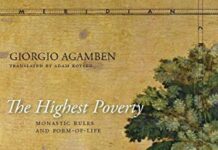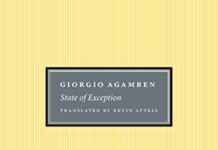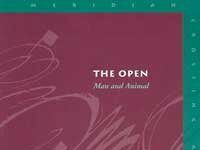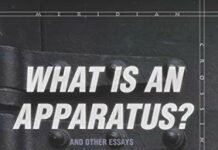
Ebook Info
- Published: 2009
- Number of pages: 128 pages
- Format: PDF
- File Size: 12.58 MB
- Authors: Giorgio Agamben
Description
The Signature of All Things is Giorgio Agamben’s sustained reflection on method. To reflect on method implies for Agamben an archeological vigilance: a persistent form of thinking whose path is to expose, examine, and elaborate that which remains obscure, unthematized, even unsaid, in an author’s thought. To be archeologically vigilant, then, is to return to, even invent, a method attuned to a “world supported by a thick plot of resemblances and sympathies, analogies and correspondences.”The range of authors and of topics Agamben collects in this slim but dense volume exemplifies this search to create a science of signatures that exceeds either a semiology or hermeneutics vainly attempting to determine the pure and unmarked signs that signify univocally, neutrally, and eternally.Three conceptual figures organize this treatise and the advent of Agamben’s own new method: the paradigm, the signature, and archeology. Each chapter is devoted to an investigation of one of these concepts whose genealogy Agamben carefully constructs transhistorically and from an interdisciplinary perspective. And at each moment of the text, Agamben pays tribute to Michel Foucault whose methods he rethinks and effectively uses to reformulate the logic of the concepts he isolates. The Signature of All Things reveals once again, how and why, Agamben is one of the most innovative thinkers writing today.
User’s Reviews
Editorial Reviews: Review “Three illuminating philosophical reflections that go beyond merely procedural issues and redefine the complicated question of method, dispelling its obscurities and drawing our attention to three conceptual figures of the greatest interest: the paradigm, the signature, and philosophical archaeology.” ― La Repubblica About the Author Giorgio Agamben is one of the leading figures in Italian philosophy. He is the author of Homo Sacer: Sovereign Power and Bare Life; Remnants of Auschwitz: The Witness and the Archive; Profanations; The Signature of All Things: On Method (the last three published by Zone Books), and other books.
Reviews from Amazon users which were colected at the time this book was published on the website:
⭐For better or worse, Agamben is now part of the oxygen literary critics need to breathe. That said, this book is marvelously suggestive, and at its best, really helps one to think about how method dictates the content of argument. The weakness is that many of the claims are really grounded in the signature of Agamben, and one would really like historically specific examples for the broad charges levied against, for example, scientific methods of the early modern and modern periods.
⭐It’s no big secret that ‘method’ has been limping under the sign of a bad star in continental philosophy for a while now. Unsurprising perhaps, since the tradition burnt its fingers early with Edmund Husserl and Henri Bergson, each being the first and last to speak of method (Husserl’s phenomenological method, Bergson’s method of intuition) without a trace of self-consciousness. Having since become easy-pickings for generations of philosophers following however, the question of method has remained a vexed one. As such, it’s with a certain strategic – if nonetheless academic – audacity that Agamben can unblinkingly subtitle his little book, “On Method.”Consider, for example, Theodor Adorno’s polemics against the ‘intolerance’ and ‘arbitrariness’ of method, whereby method is charged with ‘doing violence to unfamiliar things’ insofar as it can only ‘model the world after itself’ and ‘substitute itself for things’ (see Adorno’s brilliant tract ‘Against Epistemology’, another suitable title of which could have been ‘Against Method’). The argument being that insofar as method can only presuppose the sorts of things that will fall under its purview, anything that does not fit will invariably get tossed to the side. This is what Agamben calls the problem of relating the universal to the particular, whereby what is ‘left out’ is precisely the singular: that which is unique and unsubstitutable.In the face of these problems, Agamben proposes an alternative way of thinking method: as that which, rather than moving from the universal to the particular, moves instead from ‘singularity to singularity.’ In trying to elaborate just what this move entails, Agamben embarks on an investigation of three exemplary methodological approaches: that of the paradigm, the signature, and philosophical archeology. Those who have been following Agamben’s work till now will be more or less familiar with the first and the last of these, which have found expression in Agamben’s other works, but are for the first time explicitly taken on as themes of their own. The ‘theory of signatures’ however, the longest and most elaborate of the investigations here, has made its appearance in Agamben’s writings only relatively recently, so it’s nice to see it treated in such great detail here.Although it’s been billed as something like a ‘reply to critics’, The Signature of All Things stands very much on its own as a work of philosophy. Particularly great is the extended mediation on sacraments (as an example of a ’signature’ at work), a discussion of which felt oddly waylaid in Agamben’s ‘The Sacrament of Language’. In terms of contemporary reference points, it’s the work of Michel Foucault here which gets the most attention, particularly and unsurprisingly his more ‘methodological’ works, ‘The Order of Things’ and ‘The Archeology of Knowledge’ which Agamben treats with great respect and delicacy. As Agamben remarks, where Foucault ends and where Agamben himself begins is a little hard to parse, but that’s part of the fun. There’s also a little jab at Derrida here, which continues Agamben’s career-spanning pokes at deconstruction.One missed encounter I feel worth mentioning in closing is with the work of Ludwig Wittgenstein. Agamben’s reflections on rules and singularities bare an uncanny resemblance to Wittgentein’s own mediations on the the question of whether or not the standard meter in Paris is in fact, a meter long. When Agamben speaks, for example, of ‘the total abandonment of the particular-general couple as the model of logical inference’, and of ‘the exhibition of the paradigmatic case that constitutes a rule… which cannot be applied or stated,” is this not the same logic the governs Wittgenstein’s declaration that the meter rule in Paris is neither a meter long, nor not a meter long? In any case, something to explore! (see Paul Livingston’s work here on the politics of paradox…).
⭐This is simply the most important book by possibly the most important thinker of our age. All the questions raised by earlier works are addressed here and the method of philosophical archaeology is THE mode of critical hermeneutics of our times. There are simply no questions left hanging here as Agamben wrong foots all his critics by presenting a totally consistent critical method for undermining the predominant philosophies of difference that have held sway for so long in the academy and beyond.I realise for most Homo Sacer is the central text but the full radical meaning of Agamben’s politics cannot be understood without this work. Not only does Signature of All Things clarify Agamben’s philosophy brilliantly, it justifies claims for him to be the philosopher of our age, the work of Badiou notwithstanding.Read this book. It is an urgent need for anyone serious about critical thinking in our age of catastrophe and lassitude.
⭐Agamben’s book is a homily to ways of approaching the humanities and humanity. A great essay writer in the classical rhetorical sense – instilling a sense of curiosity, lightness and open wonder while offering substantial readings of key ideas. If elegance of knowledge be a virtue, it is here.
⭐This is simply the most important book by possibly the most important thinker of our age. All the questions raised by earlier works are addressed here and the method of philosophical archaeology is THE mode of critical hermeneutics of our times. There are simply no questions left hanging here as Agamben wrong foots all his critics by presenting a totally consistent critical method for undermining the predominant philosophies of difference that have held sway for so long in the academy and beyond.I realise for most Homo Sacer is the central text but the full radical meaning of Agamben’s politics cannot be understood without this work. Not only does Signature of All Things clarify Agamben’s philosophy brilliantly, it justifies claims for him to be the philosopher of our age, the work of Badiou notwithstanding.Read this book. It is an urgent need for anyone serious about critical thinking in our age of catastrophe and lassitude.
⭐Great product.
⭐An excellent book on methodology by Agamben. Well done.
Keywords
Free Download The Signature of All Things: On Method (Zone Books) in PDF format
The Signature of All Things: On Method (Zone Books) PDF Free Download
Download The Signature of All Things: On Method (Zone Books) 2009 PDF Free
The Signature of All Things: On Method (Zone Books) 2009 PDF Free Download
Download The Signature of All Things: On Method (Zone Books) PDF
Free Download Ebook The Signature of All Things: On Method (Zone Books)




